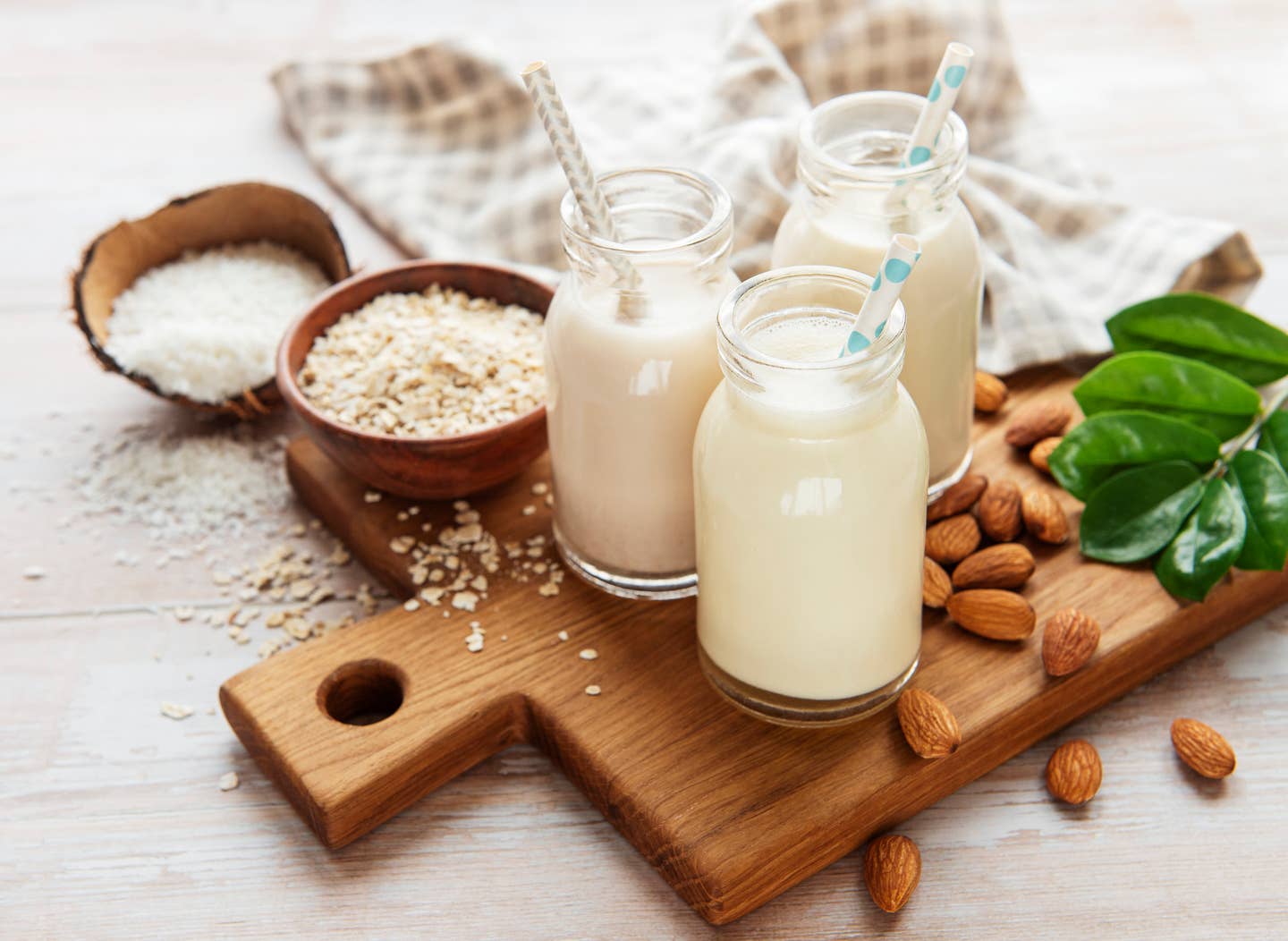
“Got Milk?” Ads Are Back. Here’s Why Going Dairy-Free is a Healthier Option
Plant-based milk sales are directly contributing to declining dairy sales, and as plant-based milk reached $3.1 billion in sales this year, dairy giants are increasingly fearful of the shifting market. In response, the California Milk Processor Board (CMPB) is reviving the "Got Milk?" campaign, which helped to halt dairy milk's decline in the mid-90s.
Originally debuted in 1993 by CMPB, the National Milk Processor Education Program (MilkPEP) acquired the ads in 1995. MilkPEP aired the "Got Milk?" advertisements for decades, featuring prominent celebrities including Britney Spears and Serena Williams. Now, a new campaign aims to fight against the plant-based dairy industry by encouraging consumers to purchase "real" milk.
Released this month, the new ad stars Mexican-born signer Diego Boneta in a fantastical world where the world is "as real as real milk," displaying scenes like overpriced taxis or an angry yoga teacher. However, this jab at plant-based milk is an attempt to challenge the ability to call dairy-free alternatives "milk."
“The definition of ‘real’ as a claim is so poorly defined or broad that its real meaning is likely to be misunderstood by the consumer … How is non-dairy milk not ‘real’?” Jennifer Kaplan, instructor of Sustainable Food Systems at the Presidio Graduate School and former Director of Sustainability at vegan brand Miyoko’s Creamery, said to VegNews. “Plant-based and non-dairy milk are ‘real,’ they are simply not cow’s milk.”
This campaign attempts to slander the plant-based milk industry without acknowledging the environmental and health risks associated with dairy-based milk products. The "got milk?" campaign is the dairy industry's attempt to distract consumers from the damaging effects of the animal agriculture industry.
The Reality of Lactose Intolerance
Nearly 80 percent of African Americans, 80 to 100 percent of Native Americans, and 90 to 100 percent of Asian Americans are lactose intolerant, according to The National Institutes of Health. Milk consumption disproportionately impacts people of color, making plant-based milk a viable and essential alternative for millions of Americans. Marketing dairy milk as "real milk" is an issue for all consumers suffering from lactose intolerance.
Many consumers have negative reactions to dairy consumption. For athletes, regular dairy consumption can cause inflammation that slows muscle recovery time and prevents lactose buildup, which can leave the body sore and fatigued for longer.
Big dairy industries are also pushing a product that is linked to heart disease and high blood pressure. Doctors have wanted patients at risk for heart disease to avoid saturated fats, which are commonly found in high quantities in cow's milk and other dairy-based products. Reducing saturated fat consumption has been linked to a lower risk of heart disease by 21 percent.
Drinking Milk Regularly Linked to Cancer
The dairy industry has received criticism for decades that milk is linked to several cancers, especially hormone-related cancers including breast and prostate. For years, experts have warned that the level of estrogen found in milk products could increase this risk because lactating cows are given estrogen to keep up milk production.
One study found that drinking milk regularly increased the risk of prostate cancer by 60 percent. For women, even one serving of milk a day can increase breast cancer risks by 30 percent.
Cows v. Plants: The Labelling Debate
Fewer than 10 percent of American consumers are confused and believe that plant-based milk uses dairy-derived ingredients, according to research from the International Food Information Council. Despite this, the dairy industries in the United States and worldwide have lashed out at plant-based companies for using terms such as "cheese" or "milk."
Last year, the California Department of Food and Agriculture attempted to prohibit vegan brands from using dairy-related products. Founder of Miyoko's Creamery, Miyoko Schinner countersued with the help of the Animal Legal Defense Fund and won, setting a precedent for plant-based brands in the U.S.
However, internationally, dairy industries still prohibit the use of dairy or animal-related terms. This month, vegan brand Rawesome sued the Canadian government to challenge the Food and Drugs Act, which prohibits plant-based companies from using dairy-adjacent terms.
For more plant-based happenings, check out The Beet's News articles.
The Top 10 Plant-Based Sources of Calcium
1. Pinto Beans
Pinto beans have 78.7 milligrams in one cup so add these to any salad, dip or burrito.
2. Molasses
Molasses has 82 milligrams in 2 tablespoons. Use it in baking instead of sugar. Look for Blackstrap molasses, and keep in mind that these have been used in recipes for 100s of years, especially in the South. Molasses is also believed to help relieve stress and anxiety.
3. Tempeh
Tempeh has 96 milligrams of calcium in 100 grams when cooked. You can make chicken substitute from it.
4. Tofu
Tofu has about 104mg in one ounce when prepared pan-fried. Throw it in your stir fry, or order it at your next Chinese meal with veggies. It's the perfect non-meat protein. (Note look for the calcium quotient on the Nutrition Facts on the label.)
5. Bok Choy
Bok choy has 158 milligrams of calcium in one cup. Add it to your soup, stir fry or salad.
6. Soybeans
Soybeans have 175 milligrams of calcium per cup. Sprinkle them on a salad.
7. Kale
Kale has 177 milligrams in one cup. The heroic green makes a great salad, goes in smoothies and delivers a healthy dose of fiber as well.
8. Turnip Greens
Turnip greens have 197 milligrams in one cup. Add them to your favorite soup or smoothie.
10. Collard Greens
Collard greens have 268 milligrams of calcium in one cup. Substitute it for string beans.
10. Milk Alternatives
Alternate milks like almond, soy or rice milk have 300-500 milligrams of calcium in 8 ounces so use any of these on your cereal or in your morning smoothie.
More From The Beet






